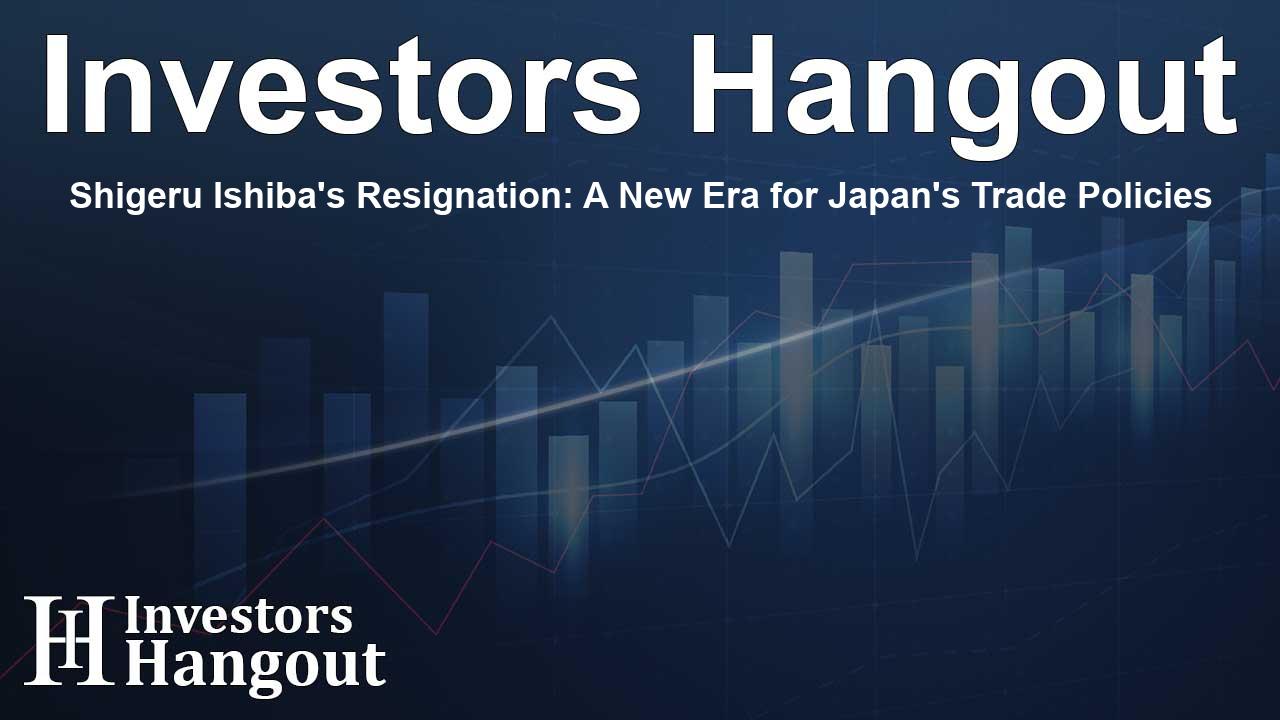Shigeru Ishiba's Resignation: A New Era for Japan's Trade Policies

Shigeru Ishiba Announces Resignation Amid Election Challenges
Shigeru Ishiba, Japan’s Prime Minister, recently resigned following notable election setbacks. This decision comes at a crucial time for Japan’s economy, which stands as one of the largest in the world. His leadership faced intense scrutiny as electoral outcomes reflected public dissatisfaction.
Election Outcomes Lead to Leadership Change
Ishiba stepped down after the ruling coalition encountered significant losses in the parliamentary elections. He expressed his intent to take accountability for these results, which were largely attributed to growing public concerns about living expenses. In a strategic move, he has called for an emergency leadership election within the Liberal Democratic Party (LDP), continuing in his role until a new leader is appointed.
The Anticipation of Resignation
The decision to resign was widely expected after the LDP's disappointing performance. Senior party officials had predicted this outcome, noting the internal discontent that had been brewing for some time.
Trade Agreement with the U.S. Under Threat
His resignation follows the finalization of a critical trade agreement with the United States, aiming to reduce tariffs implemented during Donald Trump's administration. Ishiba hopes that his successor will prioritize this agreement and address the escalating cost of living that has been troubling voters.
Insights on the Trade Deal
This pivotal $550 billion trade agreement seeks to resolve tariff disputes that Ishiba previously condemned. It includes important provisions for Japan to import U.S. products, such as the Ford F-150, amid ongoing confusion regarding tariff timelines. The political transitions in Japan could significantly impact the execution of this trade pact and the direction of economic policies.
Potential Successors and Their Impact
In light of Ishiba's resignation, prominent candidates to succeed him include veteran LDP members like Sanae Takaichi and Shinjiro Koizumi. Takaichi, in particular, is noted for her potential influence on fiscal policy and interest rates, a perspective echoed by experts in Japanese political economics.
Market Repercussions and Economic Outlook
Political fluctuations have already started to affect market conditions, as demonstrated by recent movements in the yen and bond markets. As the LDP remains the largest party in the lower house, the upcoming leadership change will play a crucial role in shaping Japan’s political and economic landscape.
Market Reactions Post-Resignation
Following Ishiba's announcement, the yen experienced a drop of 0.7% against the dollar, while the Nikkei index saw an increase of 1.52%. These fluctuations underscore the immediate impact of political change on financial markets and investor sentiment.
Frequently Asked Questions
What led to Shigeru Ishiba's resignation?
Shigeru Ishiba resigned due to significant losses in the recent parliamentary elections and public dissatisfaction with rising living costs.
What is the significance of the trade agreement with the U.S.?
The trade agreement aims to reduce tariffs, which is crucial for Japan’s economy and trade relations with the U.S., particularly under the Trump administration.
Who are the potential successors to Ishiba?
Notable successors include Sanae Takaichi and Shinjiro Koizumi, both experienced members of the Liberal Democratic Party.
How might the resignation affect Japan's economy?
The resignation could impact the implementation of vital trade agreements and overall economic policies moving forward.
What has been the market reaction to Ishiba's resignation?
Following the announcement, the yen fell, while the Nikkei index rose, reflecting investor responses to the political shift in leadership.
About The Author
Contact Riley Hayes privately here. Or send an email with ATTN: Riley Hayes as the subject to contact@investorshangout.com.
About Investors Hangout
Investors Hangout is a leading online stock forum for financial discussion and learning, offering a wide range of free tools and resources. It draws in traders of all levels, who exchange market knowledge, investigate trading tactics, and keep an eye on industry developments in real time. Featuring financial articles, stock message boards, quotes, charts, company profiles, and live news updates. Through cooperative learning and a wealth of informational resources, it helps users from novices creating their first portfolios to experts honing their techniques. Join Investors Hangout today: https://investorshangout.com/
The content of this article is based on factual, publicly available information and does not represent legal, financial, or investment advice. Investors Hangout does not offer financial advice, and the author is not a licensed financial advisor. Consult a qualified advisor before making any financial or investment decisions based on this article. This article should not be considered advice to purchase, sell, or hold any securities or other investments. If any of the material provided here is inaccurate, please contact us for corrections.
